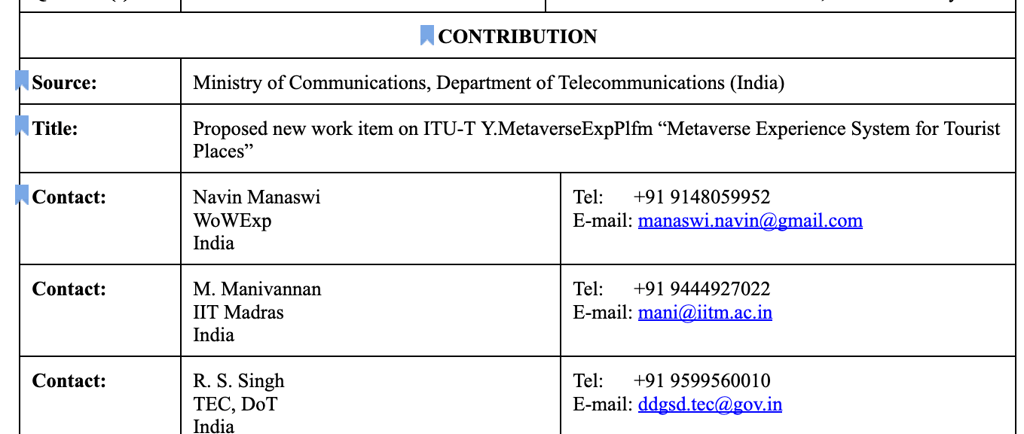Building Global Standards for a Metaverse Tourism System
Introduction The tourism industry is undergoing a digital revolution, with Metaverse technologies transforming how people explore destinations. From immersive virtual tours to AI-powered travel guides, the possibilities are endless. However, without global standards, the sector risks fragmentation, inefficiency, and missed opportunities. This is why the recent ITU-T SG 20 recommendation on the Metaverse Experience System for Tourist Places is so important. By defining a unified framework for Metaverse tourism—integrating virtual reality (VR), augmented reality (AR), IoT sensors, and real-time data analytics—this standard ensures seamless, accessible, and engaging experiences for travelers worldwide. But why do we need global standards for Metaverse tourism? Let’s explore. 1. Enhancing Visitor Engagement Through Immersive Experiences Today’s travelers expect more than static brochures or pre-recorded videos—they want interactive, personalized, and immersive experiences. How the Metaverse Tourism System Helps Virtual Tours: Explore destinations in 360° VR before booking a trip. AR Overlays: Get real-time historical facts, translations, or navigation aids while visiting a site. Gamification: Interactive quests and rewards make tourism more engaging. Without global standards, different platforms may use incompatible formats, forcing tourists to juggle multiple apps and devices. A unified system ensures seamless cross-platform experiences. 2. Making Tourism Accessible to All Millions of people face barriers to travel—physical disabilities, financial constraints, or geopolitical restrictions. The Metaverse can democratize tourism by offering virtual access to global landmarks. How Standardization Helps Accessibility Universal Design: Ensures VR/AR experiences are usable for people with disabilities (e.g., audio descriptions for the visually impaired). Low-Bandwidth Solutions: Standardized optimization allows users in developing regions to participate. Cultural Preservation: Digitally archive endangered heritage sites for future generations. A fragmented approach could leave marginalized groups behind. Global standards ensure inclusive tourism for everyone. 3. Boosting Operational Efficiency for Tourism Businesses Hotels, museums, and tour operators struggle with: High marketing costs to attract visitors. Manual ticketing and crowd management. Difficulty in updating visitor information in real time. How the Metaverse-IoT Integration Solves These Issues Smart Ticketing: NFTs or QR codes for seamless entry. Real-Time Analytics: Adjust pricing or crowd flow based on live data. Remote Collaboration: Tourism boards and content creators can co-develop virtual experiences. Standardized systems prevent vendor lock-in and ensure interoperability between different service providers. 4. Supporting Sustainable Tourism Overtourism harms fragile ecosystems and cultural sites. The Metaverse can reduce physical foot traffic while still generating revenue. How Global Standards Promote Sustainability Virtual Alternatives: Offer digital twin experiences for overcrowded destinations. Carbon Footprint Tracking: IoT sensors can measure and optimize tourism’s environmental impact. Eco-Education: Interactive Metaverse experiences can teach sustainable travel practices. Without coordination, some destinations may adopt unsustainable digital tourism models. Global guidelines ensure eco-friendly innovation. 5. Enabling Global Collaboration & Economic Growth Tourism is a trillion-dollar industry, but small businesses and developing nations often lack the tech resources to compete. How Standardization Drives Inclusion Lower Entry Barriers: Shared frameworks reduce development costs for small players. Cross-Border Tourism: A unified Metaverse ecosystem allows seamless international partnerships. New Revenue Streams: Virtual souvenirs, NFT collectibles, and premium VR tours create additional income. Fragmented systems favor big tech monopolies. Global standards ensure fair access and innovation. Conclusion: Why ITU-T’s Recommendation Is a Game-Changer The Metaverse Experience System for Tourist Places sets the foundation for: ✅ Consistent, high-quality virtual tourism experiences ✅ Greater accessibility for underserved travelers ✅ Efficient, sustainable, and profitable tourism operations By adopting global standards, we ensure that the Metaverse enhances—not disrupts—the tourism industry, making travel more engaging, inclusive, and sustainable for future generations. Call to Action Tourism boards, tech developers, and policymakers must collaborate to implement these standards. The future of travel is virtual, interconnected, and boundaryless—let’s build it together. Acknowledgement: This recommendation for Global Standards would NOT have been possible without the strong leadership of Mr. R. S. Singh, Dy. Director General (IoT), TEC, DOT, Ministry of Communications, India, and his dedicated team, who provided continuous guidance throughout the process. I am also deeply grateful to Prof. M. Manivannan and MIPS members What are your thoughts? What do you think? Should every tourist destination have a Metaverse counterpart? Share your thoughts below! #MetaverseTourism #DigitalTransformation #ITU #GlobalStandards #SustainableTourism #VR #AccessibleTravel
5/8/20241 min read


AI, Metaverse, Innovation